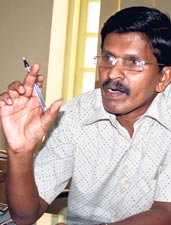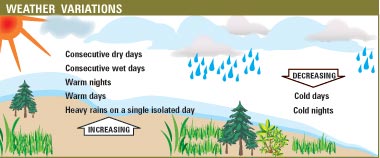Disrupted weather patterns and irregular weather behaviour can have an adverse impact on the country and the population, with potentially disastrous consequences, says a senior official at the Meteorology Department.
 |
| K. H. M. S. Premalal,
Met Department
deputy director,
climate change division |
In recent years an ebb-and-flow phenomenon has been observed in the weather, and this is affecting the country’s rainfall and temperature patterns, according to K. H. M. S. Premalal, deputy director, climate change division, Met. Department.
“There has been an increase in temperature and humidity,” Mr. Premalal says. “We see extreme weather events such as sudden heavy showers, which cause landslides and floods. “There is high humidity during the day, and the nights are warm. Over the past few years we have observed a gradual rise in the heat index, with an increase in air temperature. Even traditionally cool areas like Nuwara Eliya are experiencing warmer weather.”
Dramatic changes in the weather can also trigger health problems, Mr. Premalal says. For example, high humidity can result in heat cramps, heat stroke, skin rashes, asthma, and even premature births, low birth weight in newborns, respiratory infection, cardiovascular disease and lung cancer.
Studies show that intense heat can trigger respiratory disease and cause short-term lung problems, as well as a help to spread vector-borne diseases such as malaria and dengue, Mr. Premalal said.
“High temperatures can precipitate sudden death in persons suffering from heart problems,” he said.
“In addition, more people in developing countries are suffering from diarrhoeal disease and malnutrition. Between 90 million and 200 million more people will be at risk from malaria and other vector-borne diseases, and around 2.5 billion more people will likely be exposed to dengue,” he said.
Health aside, water sources and agriculture are also affected by abnormal weather behaviour.
 “We have noted a 5.9 per cent drop in rice yields,” Mr. Premalal says. “During the 2007 Maha season, there was a drop in paddy yield because of high rainfall variability in the second inter-monsoon period and the northeast monsoon. In 2008 it rained for 30 days during the harvest period and crops were ruined. And this year we didn’t get the expected rainfall,” he said. “Remember that rice farming is the livelihood of more than 1.8 million farmers in the country. “We have noted a 5.9 per cent drop in rice yields,” Mr. Premalal says. “During the 2007 Maha season, there was a drop in paddy yield because of high rainfall variability in the second inter-monsoon period and the northeast monsoon. In 2008 it rained for 30 days during the harvest period and crops were ruined. And this year we didn’t get the expected rainfall,” he said. “Remember that rice farming is the livelihood of more than 1.8 million farmers in the country.
Meanwhile, rising sea levels are causing saltwater intrusion and increasing salinity in the soil and putting agricultural land at risk. “The UN has given us paddy strains that can tolerate drought conditions. We have distributed these special rice varieties to farmers in Puttalam. We should be thinking of similar approaches to carrying out other types of cultivation,” he said.
 According to the typical annual weather pattern, the country experiences its first inter-monsoon period between March and April; the southwest monsoon between May and September, the second inter-monsoon between October and November, and the northeast monsoon between December and February. However, the monsoon pattern has shown fluctuations. According to the typical annual weather pattern, the country experiences its first inter-monsoon period between March and April; the southwest monsoon between May and September, the second inter-monsoon between October and November, and the northeast monsoon between December and February. However, the monsoon pattern has shown fluctuations.
“August is usually a breezy month, with people typically flying kites at this time of the year and enjoying the outdoors. This year August was a month of heavy scattered rains.”
Mr. Premalal said sudden heavy showers were causing floods and landslides.
“Almost 30 per cent of the land area in Sri Lanka is endangered. Heavy rainfall is the main triggering mechanism for landslides. Ten districts out of 25 are vulnerable to landslides,” he said. |


 “We have noted a 5.9 per cent drop in rice yields,” Mr. Premalal says. “During the 2007 Maha season, there was a drop in paddy yield because of high rainfall variability in the second inter-monsoon period and the northeast monsoon. In 2008 it rained for 30 days during the harvest period and crops were ruined. And this year we didn’t get the expected rainfall,” he said. “Remember that rice farming is the livelihood of more than 1.8 million farmers in the country.
“We have noted a 5.9 per cent drop in rice yields,” Mr. Premalal says. “During the 2007 Maha season, there was a drop in paddy yield because of high rainfall variability in the second inter-monsoon period and the northeast monsoon. In 2008 it rained for 30 days during the harvest period and crops were ruined. And this year we didn’t get the expected rainfall,” he said. “Remember that rice farming is the livelihood of more than 1.8 million farmers in the country.  According to the typical annual weather pattern, the country experiences its first inter-monsoon period between March and April; the southwest monsoon between May and September, the second inter-monsoon between October and November, and the northeast monsoon between December and February. However, the monsoon pattern has shown fluctuations.
According to the typical annual weather pattern, the country experiences its first inter-monsoon period between March and April; the southwest monsoon between May and September, the second inter-monsoon between October and November, and the northeast monsoon between December and February. However, the monsoon pattern has shown fluctuations.